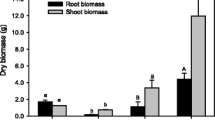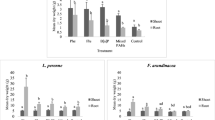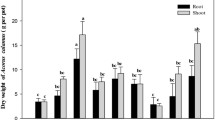Abstract
The aim of the present study was to investigate the uptake of 16 PAHs by willow (Salix viminalis) from soil amended with contaminated sewage sludge. Uptake experiments were conducted on field plots using sludge applications of 0, 30, 75, 150, 300, and 600 Mg ha−1. The total PAH content of control soil and sludge were 49.6 μg kg−1 and 5713 μ g kg−1, respectively. The concentrations for the 16 PAHs listed as priority pollutants were measured for soil and plant tissue samples obtained at 0.5, 1.5, 2.5, and 3.5 years. Soil total PAH content decreased significantly within the first half year, followed by minimal changes over the subsequent three years of treatment. PAH analysis was carried out on a HPLC-UV. Total PAH content in control plants was 3.6–7.3 μ g kg−1 for shoots and 13–27 μ g kg−1 for leaves. Treated plant tissue content was higher with shoots and leaves containing ∼5.5–17.6 and 13.5–33.8 μg kg−1, respectively. Plant total PAH content did not show a significant trend relative to controls with respect to time. However, uptake did increase in relation to an increased sludge application. Bioconcentration factors (BCF), adjusted by control values, were calculated for total PAH content. BCF values were highest for the initial sampling (6 months) and did not show a significant temporal relationship. BCF values did decrease with increasing sludge application. With respect to individual PAHs, elevated plant tissue concentrations were measured for “light” PAH (e.g. naphthalene, phenanthrene, acenaphthalene) with leaf BCF values correlated with solubility and organic partitioning coefficients.
Similar content being viewed by others
References
Alexander, M.: 2000, ‘Aging, bioavailability, and overestimation of risk from environmental pollutants’, Environ. Sci. Technol. 34, 4259–4265.
Bakker, M. I.: 2000, ‘Atmospheric deposition of semi-volatile organic compounds to plant’, Ph.D. Thesis. Utrecht University.
Baran, S., Bielińska, E. J. and Oleszczuk, P.: 2004, ‘Enzymatic activity in an airfield soil polluted with polycyclic aromatic hydrocarbons (PAH)’, Geoderma 118, 221–232.
Baran, S. and Oleszczuk, P.: 2003, ‘Changes in the content of polycyclic aromatic hydrocarbons (PAHs) in light soil fertilised with sewage sludge’, J. Environ. Sci. Health A 38, 793–805.
Barraclough, D., Kearney, T. and Croxford, A.: 2005, ‘Bound residues, environmental solution or future problem?’, Environ. Pollut. 133, 85–90.
Bellin, C. A. and O'Connor, G. A.: 1990, ‘Plant uptake of pentachlorophenol from sludge-amended soils’, J. Environ. Qual. 19, 598–602.
Camargo, M. C. R. and Toledo, M. C. F.: 2003, ‘Polycyclic aromatic hydrocarbons in Brazilian vegetables fruits’, Food Control 14, 49–53.
Cousins, I.T., Hartlieb, N., Teichmann, C. and Jones, K. C.: 1997, ‘Measured and predicted volatilisation fluxes of PCBS from contaminated sludge-amended soils’, Environ. Pollut. 97, 229–238.
Duarte-Davidson, R. and Jones, K. C.: 1996, ‘Screening the environmental fate of organic contamiants in sewage sludge applied to agricultural soils. II. The potential for transfers to plants and grazing animals’, Sci. Total Environ. 185, 59–70.
Fismes, J., Perrin-Ganier, C., Empereur-Bissonnet, P. and Morel, J. L.: 2002, ‘Soil-to-Root transfer and translocation of polycyclic aromatic hydrocarbons by vegetables grown on industrial contaminated soils’, J. Environ. Qual. 31, 1649–1656.
Gao, Y. and Zhu, L.: 2004, ‘Plant uptake, accumulation and translocation of phenanthrene and pyrene in soils’, Chemosphere 55, 1169–1178.
Ghosh, U., Zimmerman, J. R. and Luthy, R. G.: 2003, ‘PCB and PAH speciation among particle types in contaminated harbor sediments and effects on PAH bioavailability’, Environ. Sci. Technol. 37, 2209–2217.
Ghosh, U., Talley, J. W. and Luthy, R. G.: 2001, ‘Particle-scale investigation of PAH desorption kinetics and thermodynamics from sediment’, Environ. Sci. Technol. 35, 3468–3475.
Grova, N., Laurent, C., Feidt, C., Rychen, G. and Laurent, F.: 2000, ‘Gas chromatography-mass spectrometry study of polycyclic aromatic hydrocarbons in grass and milk from urban and rural farms’, Eur. J. Mass Spectrom. 6, 457–460.
Guggenberger, G., Pichler, M., Hartmann, R. and Zech, W.: 1996, ‘Polycyclic aromatic hydrocarbons in different forest soils, mineral horizons’, Z. Pflanzenernahr. Bodenk. 159, 565–573.
Harms, H. H.: 1996, ‘Bioaccumulation and metabolic fate of sewage sludge derived organic xenobiotics in plants’, Sci. Total Environ. 185, 83–92.
Jiries, A., Hussain, H. and Lintelmann, J.: 2000, ‘Determination of polycyclic aromatic hydrocarbons in wastewater, sediments, sludge and plants in Karak province, Jordan’, Water Air and Soil Pollut. 121, 217–228.
Jones, K. C. and Duarte-Davidson, R.: 1997, ‘Transfer of airborne PCDD/Fs to bulk deposition collectors and herbage’, Environ. Sci. Technol. 31, 2937–2943.
Kipopoulou, A. M., Manoli, E. and Samara, C.: 1999, ‘Bioconcentration of polycyclic aromatic hydrocarbons in vegetables grown in an industrial area’, Environ. Pollut. 106, 369–380.
Kirchmann, H. and Tengsved, A.: 1991, ‘Organic pollutants in sewage sludge. 2. Analysis of barley grains grown on sludge-fertilized soil’, Swedish J. Agric. Res. 21, 115–119.
Kuzovkina, Y. A., Knee, M. and Quigley, M. F.: 2004, ‘Cadmium and copper uptake and translocation in five willow (Salix L.) species’, Int. J. Phytoremed. 6, 269–287.
Larsson, B. and Sahlberg, G.: 1981, ‘Polycyclic aromatic hydrocarbons in Lettuce. Influence of a highway and an aluminum smelter’, Proceeding of the 6th Intern. Symposium Polynuclear Aromatic Hydrocarbons – Physical and Biological Chemistry, Columbus, USA.
Luthy, R. G., Aiken, G. R., Brusseau, M. L., Cunningham, S. D., Gschwend, P. M., Pignatello, J. J., Reinhard, M., Traina, S. J., Weber, W. J. Jr. and Westall, J. C.: 1997, ‘Sequestration of hydrophobic organic contaminants by geosorbents’, Environ. Sci. Technol. 31, 3341–3347.
Malawska, M. and Wilkomirski, B.: 2001, ‘An analysis of soil and plant (Taraxacum officinale) contamination with heavy metals and polycyclic aromatic hydrocarbons (PAHs) in the area of the railway junction Ilawa Główna, Poland’, Water Air and Soil Pollut. 127, 339–349.
Meharg, A. A., Wright, J., Dyke, H. and Osborn, D.: 1998, ‘Polycyclic aromatic hydrocarbon (PAH) dispersion and deposition to vegetation and soil following a large scale chemical fire’, Environ. Pollut. 99, 29–36.
Nadal, M., Schunhmacher, M. and Domingo, J. L.: 2004, ‘Levels of PAHs in soil and vegetation samples from Tarragona County, Spain’, Environ. Pollut. 132, 1–11.
Nieman, J. K. C., Sims, R. C., Sims, J. L., Sorensen, D. L., McLean, J. E. and Rice, J. A.: 1999, ‘[14C] pyrene bound residue evaluation using MIBK fractionation method for creosote-contaminated soil’, Environ. Sci. Technol. 33, 776–781.
Oleszczuk, P. and Baran, S.: 2004, ‘Application of solid-phase extraction to determination of polycyclic aromatic hydrocarbons in sewage sludge’, J. Hazard. Mater. 113, 237–245.
Oleszczuk, P. and Baran, S.: 2003, ‘Optimization of ultrasonic extraction of polycyclic aromatic hydrocarbons from sage sludge samples’, Chem. Anal. 48, 211–221.
Oleszczuk, P. and Baran, S.: 2005a, ‘Influence of soil fertilization by sewage sludge on the content of polyaromatic hydrocarbons (PAHs) in plants’, J. Environ. Sci. Heal. B40 (in press).
Oleszczuk, P. and Baran, S. 2005b, ‘Kinetics of PAHs losses and relationships between PAHs properties and properties of soil in sewage sludge-amended soil’, Polycyc. Arom. Comp. (in press).
Oleszczuk, P. and Baran, S.: 2005c, ‘The concentration of polycyclic aromatic hydrocarbons in sewage sludge-amended soil’, Commun. Soil Sci. Plan. 36, 1083–1097.
Parrish, Z. D., Banks, M. K. and Schwab, A. P.: 2000, ‘Effectiveness of phytoremediation as a secondary treatment for polycyclic aromatic hydrocarbons (PAHs) in composted soil’, Int. J. Phytoremed. 6, 119–137.
Paterson, K. G. and Schnoor, J. L.: 1992, ‘Fate of alachlor and atrazine in a riparian zone field site’, Water Environ. Res. 64, 274–283.
Pignatello, J. J. and Xing, B.: 1996, ‘Mechanisms of slow sorption of organic chemicals to natural particles’, Environ. Sci. Technol. 30, 1–11.
Schnoor, J. L., Licht, L. A., McCutcheon, S. C., Wolfe, L. N. and Carreira, L. H.: 1995, ‘Phytoremediation of organic and nutrient contaminants’, Environ. Sci. Technol. 29, 318–323.
Semple, K. T., Morriss, W. J. and Paton, G. I.: 2003, ‘Bioavailability of hydrophobic organic contaminants in soils, fundamental concepts and techniques for analysis’, Eur. J. Soil Sci. 54, 809–818.
Sims, R. C. and Overcash, M. R.: 1983, ‘Fate of polynuclear aromatic compounds (PNAs) in soil-plant systems’, Resid. Rev. 88, 1–68.
Smith, K. E. C. and Jones, K. C.: 2000, ‘Particles and vegetation, implications for the transfer of particle-bound organic contaminants to vegetation’, Sci. Total Environ. 246, 207–236.
Talley, J. W., Ghosh, U., Tucker, S. G., Furey, J. S. and Luthy, R. G.: 2002, ‘Particle-scale understanding of the bioavailability of PAHs in sediment’, Environ. Sci. Technol. 36, 477–483.
Tao, S., Cui, Y. H., Li, B. G., Cao, J., Liu, W. X., Schmitt, G., Wang, X. J., Shen, W. R., Quing, B. P. and Sun, R.: 2004, ‘Polycyclic aromatic hydrocarbons (PAHs) in agricultural soil and vegetables from Tianjin’, Sci. Total Environ. 320, 11–24.
Thompson, P. L., Ramer, L. A. and Schnoor, J. L.: 1998, ‘Uptake and transformation of TNT by hybrid poplars trees’, Environ. Sci. Technol. 32, 975–980.
Tolls, J. and McLachlan, M. S.: 1994, ‘Partitioning of semivolatile organic compounds between air and Lollium multiflorum (Welsh Ray Grass)’, Environ. Sci. Technol. 28, 159–166.
Topp, E., Scheunert, I., Attar, A. and Korte, F.: 1986, ‘Factors affecting the uptake of 14C-labeled organic chemicals by plants from soil’, Ecotox. Environ. Safe. 24, 1246–1252.
Trapp, S. and Matthies, M.: 1997, ‘Modeling volatilization of PCDD/F from soil and uptake into vegetation’, Environ. Sci. Technol. 331, 71–74.
US EPA: 1985, ‘Evaluation and estimation of potential carcinogenic risks of polynuclear aromatic hydrocarbons’, US Environmental Protection Agency. Washington DC.
Vervaeke, P., Luyssaert, S., Mertens, J., Meers, E., Tack, F. M. G. and Lust, N.: 2003, ‘Phytoremediation prospects of willow stands on contaminated sediment, a field trial’, Environ. Pollut. 126, 275–282.
Voutsa, D. and Samara, C.: 1998, ‘Dietary intake of trace elements and polycyclic aromatic hydrocarbons via vegetables grown in an industrial Greek area’, Sci. Total Environ. 218, 203–216.
Wild, S. R., Jones, K. C. and Johnston, A. E.: 1992, ‘The polynuclear aromatic hydrocarbon (PAH) content of herbage from a long-term grassland experiment’, Atmos. Environ. 26A, 1299–1307.
Wild, S. R. and Jones, K. C.: 1992, ‘Polynuclear aromatic hydrocarbons uptake by carrots grown in sludge amended soil’, J. Environ. Qual. 21, 217–225.
Wild, S. R. and Jones, K. C.: 1994, ‘The significance of polynuclear aromatic hydrocarbons applied to agricultural soils in sewage sludges in the U.K.’, Waste Manage. Res. 12, 49–59.
Wolters, A., Kromer, T., Linnemann, V., Ophoff, H., Stork, A. and Vereecken, H.: 2002, ‘Volatilization of [14C]fluoranthene and [14C]diflufenican after soil surface application under field-like conditions: Measurement and comparison with different model approaches’, Agronomie 22, 337–350.
Author information
Authors and Affiliations
Corresponding author
Rights and permissions
About this article
Cite this article
Oleszczuk, P., Baran, S. Polycyclic Aromatic Hydrocarbons Content in Shoots and Leaves of Willow (Salix viminalis) Cultivated on the Sewage Sludge-Amended Soil. Water Air Soil Pollut 168, 91–111 (2005). https://doi.org/10.1007/s11270-005-0884-7
Received:
Accepted:
Issue Date:
DOI: https://doi.org/10.1007/s11270-005-0884-7




